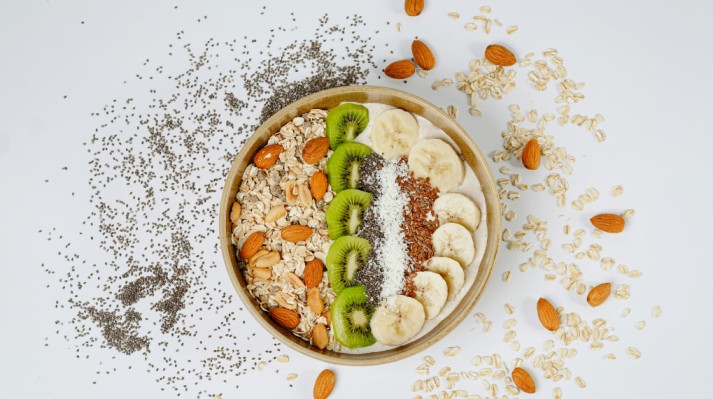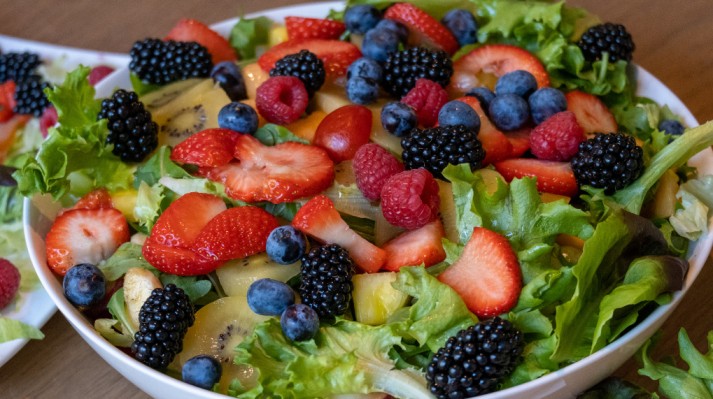Did you know a typical human spends about one-third of their life sleeping? Sleeping is an essential part of our daily lives. A night of good sleep is crucial for humans to function properly, as it gives time for our bodies to rest, repair, and rejuvenate. A lack of good sleep not only affects your moods, motor skills, and exercise performance but also weakens your immune system, leading to further health complications. Sleep deprivation has been known to cause diseases such as heart disease, diabetes, weight gain, and more.
A lack of sleep can be categorized as similar to cigarette addiction and obesity, as these chronic conditions slowly and steadily do ill work on our health. While eating is not a complete/total solution to a better sleep cycle, as all the processes in the human body are interconnected, the food we consume heavily affects the quality of our sleep.
In today’s fast-paced world, it can be hard to find enough sleep. Especially with the interference of technology and taking work to bed, sleep deprivation has become a norm. The first step we can take to improve our sleep schedule is through what we eat and by structuring proper times to eat it. Throughout this blog, let us take a look at some foods that can improve sleep quality.
The Science of Sleep and Nutrition
As we’ve discussed before, nutrition and sleep are deeply intertwined. This is so as our bodies are dependent on sleep-inducing hormones such as melatonin and serotonin to regulate proper sleep. Let us have a detailed look at how diets affect sleep and common foods that act as sleep disrupters:
How Diet Affects Sleep
Studies show that consuming foods that contain high-fiber and low-saturated fats and decreasing the intake of refined carbohydrates can efficiently improve sleep quality. When it comes to foods that improve sleep quality, lack of healthy fats, carbohydrates, and proteins has been shown to worsen sleep quality. Many studies have been conducted that show, indirectly, how food impacts sleep. The research paints an even clearer picture of how sleep patterns influence a person’s eating habits and how their body responds to food.
Common Sleep Disruptors
Studies have found certain components in common/day-to-day foods that are heavy disruptors of sleep. It is better to avoid foods that contain these elements, especially before bedtime. Let us have a look at these components:
- Foods with Caffeine: Coffee, tea, dark chocolate, soft drinks, & carbonated soft drinks.
- Foods with Alcohol: Beer, wine, liquor, & foods containing alcohol, such as rum cake, etcetera.
- Foods with heavy amounts of fats: Fried foods such as french fries and fried chicken, fats from red meat, processed meats such as bacon, sausages and other sources of unsaturated fats such as butter, cream, & cheese.
- Foods that contain high sugar: Candy, cookies, cereals with sugar, pastries, ice cream, aerated beverages with sugar, & foods with added sugar.
- Foods low in fiber: White bread, white rice, processed snacks, and foods made from refined grains.
- Foods high in carbohydrates and low in fats: White rice, white bread, sugary cereals, cookies, cakes, processed foods containing low amounts of fats.
- Foods low in Tryptophan: Processed & refined foods such as chips and crackers and foods low in protein.
These foods may be hard to avoid, but limiting them can help in enhancing your sleep cycle.
Foods That Promote Sleep
As we have seen above, foods that are high in fiber, foods low in saturated fats, & foods that contain simple carbs are vital foods that can help promote good sleep. Foods that contain sleep-promoting components such as tryptophan, vitamins, melatonin, and serotonin are also highly encouraged. Let us look at some particular foods that can improve good sleep:
Nuts: Nuts like cashews, almonds, and pistachios contain varying amounts of melatonin and omega-3 fatty acids, in addition to minerals such as magnesium and zinc. These elements are core components that help in improving sleep.
Fresh Herbs: Fresh herbs such as basil and sage contain components that can mitigate tension and help improve and induce proper sleep.
Leafy Green Vegetables: Leafy green vegetables such as spinach, kale, and lettuce contain nutrients such as magnesium and calcium and antioxidants that encourage sleep.
Fatty Fish: Fatty fish such as salmon and other fish that contain healthy doses of vitamin D and omega-3 fatty acids were found to provide good sleep as well as improvement in daytime functioning.
Magnesium-rich foods: Foods high in magnesium, such as avocados and black beans, are known for improving sleep.
Other foods that help in improving sleep include a combination of foods such as bananas with yogurt, low-fat cheese with pita chips, and peanut butter with whole-grain crackers. Make sure that all these foods are consumed in moderation.
Beverages for Better Sleep
Now that we’ve looked at some foods that help in improving sleep, let’s go through some beverages that help in improving sleep:
Warm Milk: Warm milk contains tryptophan, which is the base component for melatonin and serotonin. Milk also calms the nervous system and helps in inducing good sleep.
Herbal Tea: Herbal teas such as lavender, chamomile, and peppermint are caffeine-free relaxants that contain antioxidants that improve sleep.
Coconut Water: Coconut water is a good source of magnesium and potassium, which are core components that help in good sleep.
Almond Milk: Almond milk contains magnesium and calcium, which help in muscle relaxation as well as in the improvement of sleep.
Tart Cherry Juice: Tart Cherry juice is a natural source of melatonin and helps in the proper regulation of the sleep cycle.
Lifestyle Tips to Support Better Sleep
Proper nutrition can improve your sleep to a point. However, there are some more factors that, if implemented properly, can positively refine the quality of your sleep:
Consistent Sleep Schedule: You can align your circadian system to your healthy limit by keeping your sleep timings more consistent. This can also help you time your foods appropriately and help in improving your digestive process.
Limiting Screen Time: Limit your exposure to screens before going to bed. Blue light emerging from screens such as your laptop, phones, & tablets can hinder your melatonin production process.
Physical Activity: Staying physically active can help regulate hormones, which are critical for sleep. Exercise also complements your body’s circadian rhythm, making it easier for you to sleep at night.
Managing Stress: Implementing activities that can help reduce stress in your body, such as yoga and sports, can improve your sleep.
Exposure to Natural Light: Exposure to natural night and limiting light in your sleeping environment to an extreme low can help your circadian rhythm and promote better sleep.
Nutrition for Good Sleep with Qua Nutrition
Hope you got some idea about the foods to improve sleep quality. Good nutrition plays a vital role in enhancing sleep quality, as the foods we consume directly impact our body’s ability to produce hormones that promote sleep, such as melatonin and serotonin. Encouraging nutritional foods and limiting sleep-disrupting factors can make a major difference in your sleep cycle. A balanced diet with well-timed meals can help regulate your circadian rhythm and promote overall health.
At Qua Nutrition, we specialize in crafting personalized nutrition plans to support better sleep and overall well-being. Our team of expert dietitians and nutritionists uses studies and research to address individual needs, ensuring you get the right balance of nutrients for improved sleep quality and health. If you’re looking to optimize your nutrition and achieve restful sleep, let Qua Nutrition guide you on your journey. Contact us today to take the first step towards better sleep and health!









